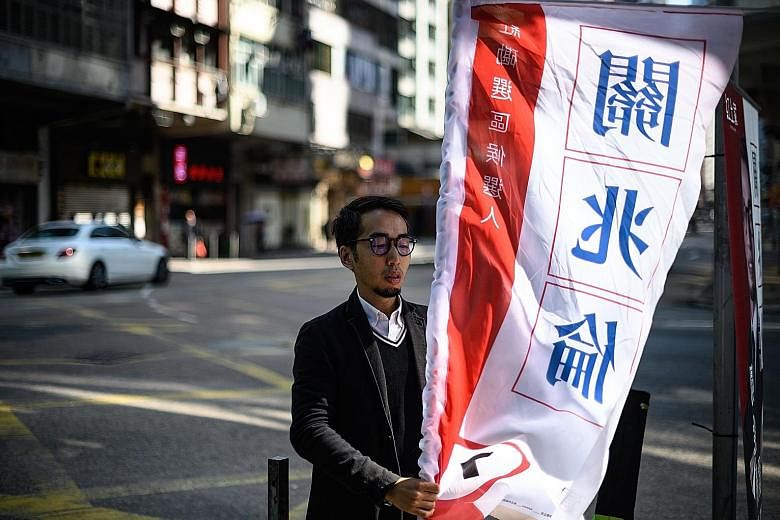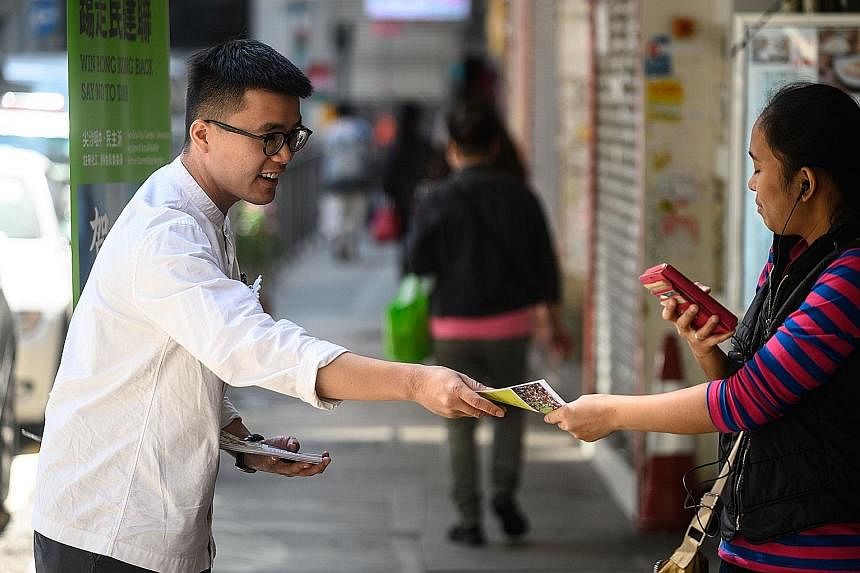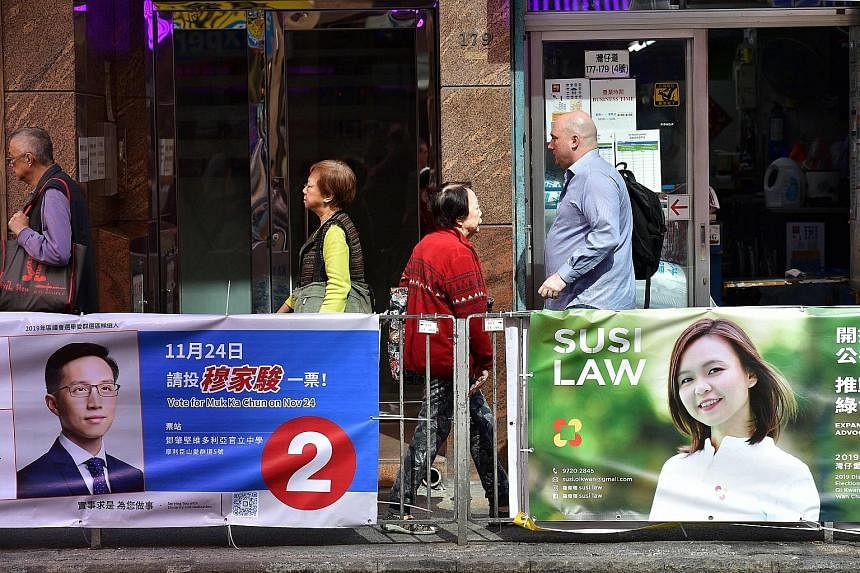HONG KONG • Abuse, threats, protests and police cordons: first-time candidate Kwan Siu Lun says campaigning for this weekend's district elections in Hong Kong has been a dangerous business in the heat of the city's political crisis.
"I try to focus on local community issues," says the 38-year-old architect, who is running as an independent on the pro-democracy side in his working-class constituency of Hung Hom.
"But, of course, some voters ask what my political views are... some people have sworn at me and thrown my leaflets to the ground."
Polling stations are due to open across Hong Kong tomorrow morning as the semi-autonomous city of 7.5 million votes for district councillors, in a ballot seen as a gauge of the popularity of Chief Executive Carrie Lam.
In normal times, district elections are tame, hyper-local affairs dominated by candidates allied to the China-backed government with a remit over rubbish collections and planning decisions.
But with protests coursing through the city, pro-democracy candidates are hoping for a dramatic swing in their favour.
Police appealed yesterday to protesters in the China-ruled city not to disrupt the lowest-tier, district council elections, held every four years, pointing to nearly six months of protests and street clashes that officials say have brought the city to the "brink of total breakdown".
"We have to ensure voter safety and let them vote without any interference," Police Commissioner Chris Tang said at a briefing after a two-day lull in violence. He said police would "deploy high-profile patrols" near polling stations.
The protest movement needs a big turnout - it was 47 per cent the last time around in 2015 - to give the unpopular government a bloody nose at the ballot box.
-
POLL NUMBERS
-
4.1 m
Number of Hong Kongers registered to vote in the district elections.452
Number of councillors across 18 districts to be chosen.1,104
Number of candidates.
The signs point in their favour, with 4.1 million Hong Kongers registering to vote - nearly 400,000 more than in 2015.
There are no disruptive actions planned so far tomorrow, while a "How to cast a vote" airdrop is urging young voters to turn up early, bring their ID and "avoid wearing black shirts and masks" or accidentally spoiling ballots.
The poll to choose 452 councillors across 18 districts is the closest voters in Hong Kong get to direct representation.
A record 1,104 people are running. By contrast, members of the city's legislature are elected by a combination of popular vote and industry groups stacked with Beijing loyalists, while the city's chief executive is chosen by a similarly pro-establishment committee.
This year, it is "a kind of referendum" on the Hong Kong government's handling "of the riots over the extradition (Bill), democracy and the conflicts between the people and the police", says political analyst Dixon Sing.
The political unrest of recent months has overshadowed what would normally be a calm campaign.
A pro-democracy candidate had his ear bitten off, while 17 other candidates of all stripes have been arrested over protest-related activities. In the hurly-burly of a political crisis, it is also hard to predict who is likely to triumph in tomorrow's poll. But there is a strategic imperative for a protest movement that has brought millions onto the streets to also flood the polling booths.
Under the city's electoral system, seats on the district council could translate into 117 votes in the Election Committee - the mechanism by which a chief executive is chosen. A big win at grassroots level in the city's most free vote could help mobilise the pro-democracy bloc for next year's parliamentary elections, says Mr Sing.
Protesters trickled out of a besieged Hong Kong university campus yesterday as a week-long siege appeared close to an end.
Half a dozen protesters left Hong Kong Polytechnic University and surrendered to police around dawn, with two more following shortly afterwards, bringing to around 30 the number who have turned themselves in over the past day and leaving only a handful inside.
Police chief Tang called on the remaining protesters to leave, but said there was no deadline to clear them.
"Not all of them want to leave," said student leader Owen Li. "They still insist on staying and are refusing to be arrested to avoid any unfair circumstances."
In another development, Hong Kong's High Court said the government would be allowed to reinstate a controversial law banning protesters from wearing face masks for seven days after earlier ruling it "unconstitutional", Radio Television Hong Kong reported.
Meanwhile, the family of a 70-year-old street cleaner who died after being hit by a brick during a clash between protesters and residents called yesterday for the police to bring his killer to justice.












